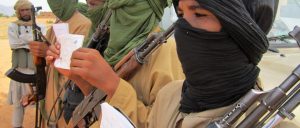The conflict in Mali is spilling over to Burkina Faso and Niger, with a significant surge of attacks by extremist groups in border areas over past months, the UN envoy for West Africa warned.
Mohamed Ibn Chambas said deadly attacks along border areas were having an impact on the local economy in the northern provinces of Burkina Faso and western regions of Niger.
“In the Sahel, persistent instability in Mali is spilling over to Burkina Faso and Niger, with deadly attacks along border areas,” Chambas told the UN Security Council.
The Liptako Gourma region, which encompasses the border areas of Mali, Burkina Faso and Niger, “has seen a significant expansion of violent extremist and terrorist activities in the past months, including coordinated cross-border attacks against security posts and ransacking of border settlements,” he said.
Drug smugglers, human traffickers and arms peddlers crisscross borders, establishing a tentative presence before moving to new zones of operation, said Chambas.
The Security Council last month adopted a French-drafted resolution that welcomed the deployment of a 5,000-strong force set up by the three countries along with Mauritania and Chad to fight jihadists in the region.
But that resolution fell short of a full UN authorization after the United States raised objections amid concerns that UN member-states would need to provide funding for the Sahel force.
In his remarks, Chambas said the countries of the Sahel are in need of “more support” to confront growing concerns over security.
In January, Mali, Burkina Faso and Niger agreed to pool their military and intelligence resources to address the cross-border crime, setting up a joint force in parallel with the Sahel operation.
The United Nations has 12,500 troops and police serving in the MINUSMA force in Mali, considered the world body’s most dangerous peacekeeping mission.
France maintains 4,000 troops in the five Sahel countries as part of a counter-terror force deployed since its 2013 military intervention in Mali to drive out jihadist groups.
In 2012, Mali’s north fell under the control of jihadist groups linked to Al-Qaeda who exploited an ethnic Tuareg-led rebel uprising.
While the Islamists were largely ousted by the French-led military operation, attacks have continued on civilians, the Malian army as well as French and UN forces.



